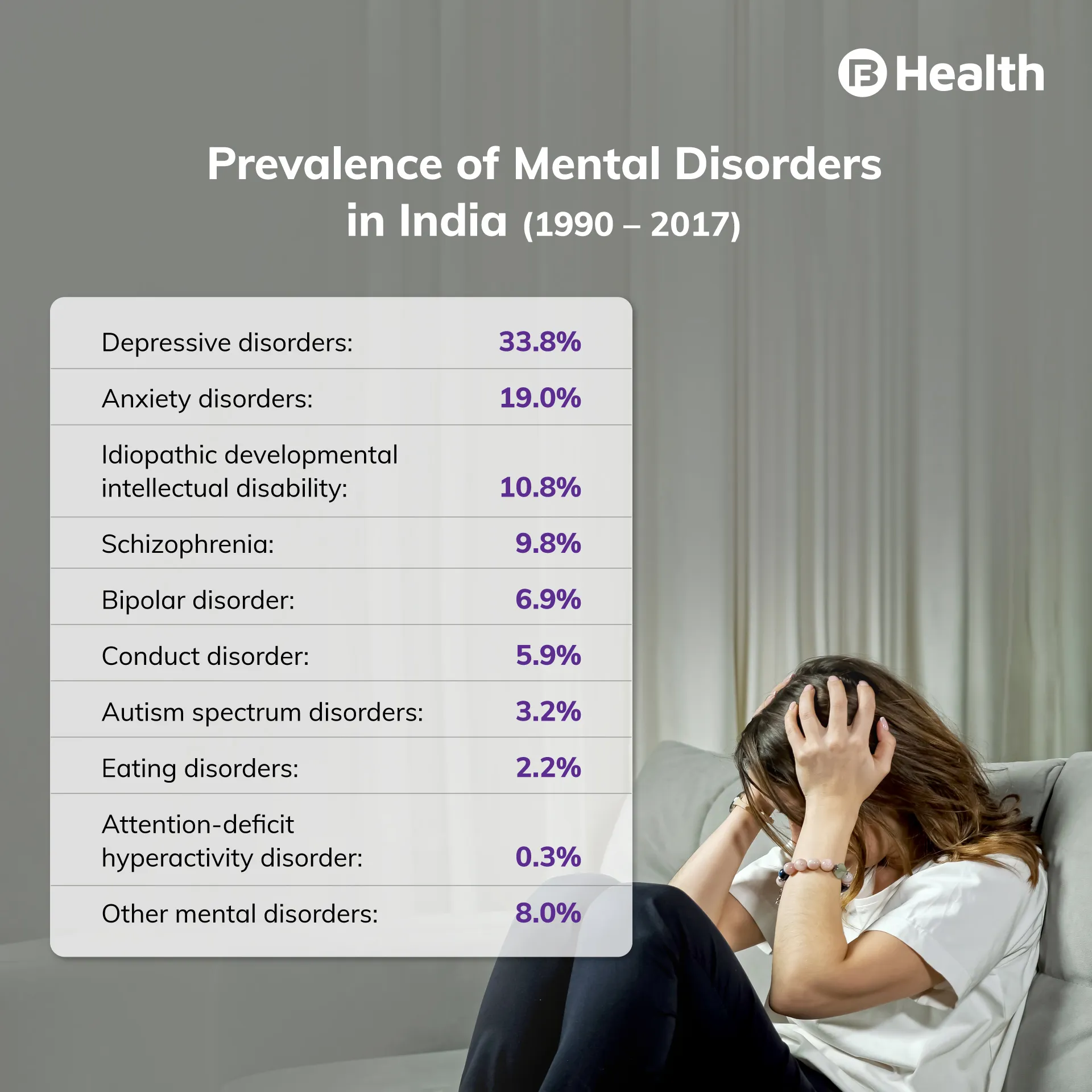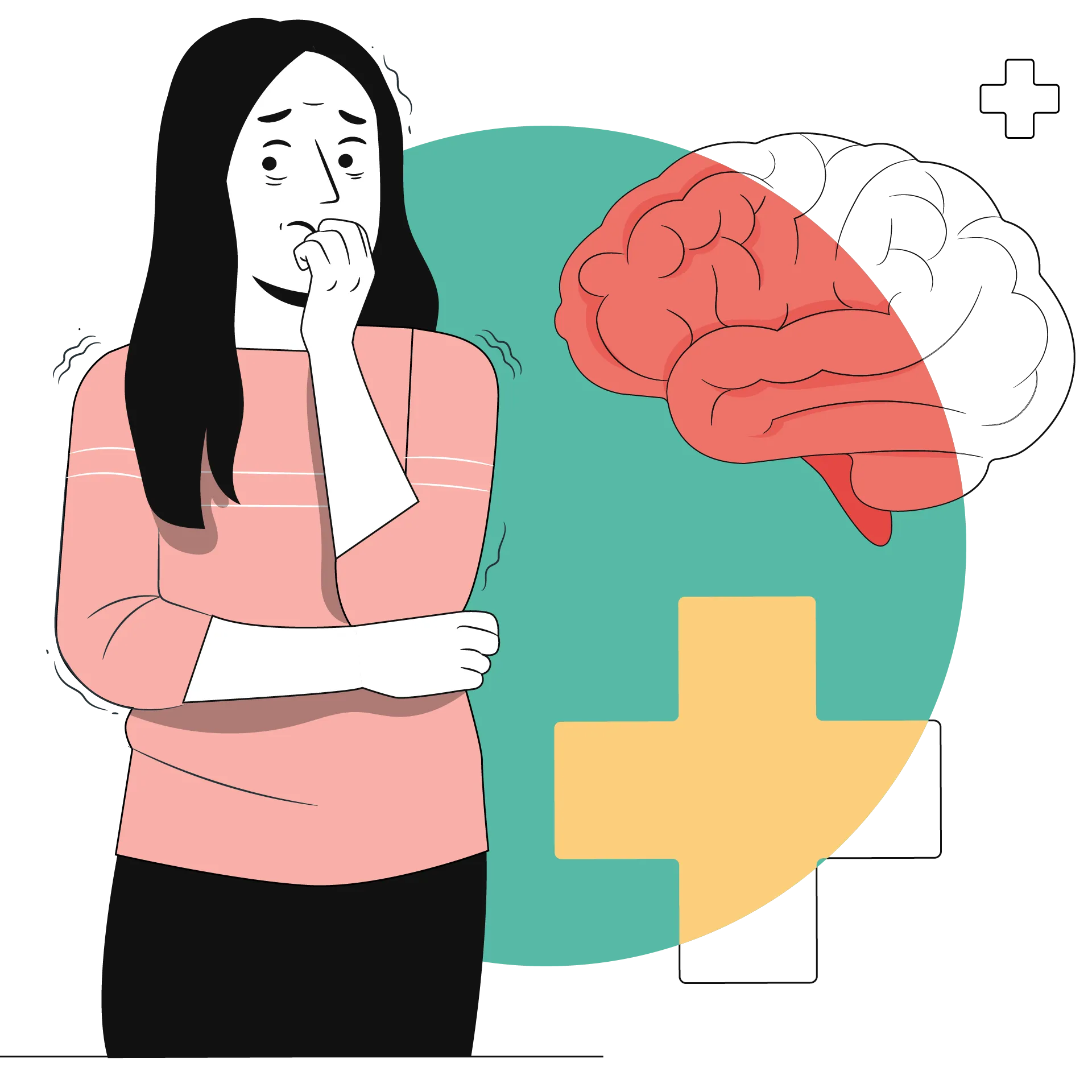Psychiatrist | 4 min read
Common Types of Mental Disorder You Should be Aware of
Medically reviewed by
Table of Content
Key Takeaways
- Excessive fear and worry are common mental illness symptoms
- Depression is one of the most common types of mental illness
- Eating disorders and mood disorders are types of mental disorders
The impact of mental illness on health, human rights, and the economy keeps growing in the present times [1]. Many types of mental disorders can affect a person’s thoughts, mood, and behavior. Some common mental illness symptoms include [2]
- excessive worrying
- excessive fear
- extreme mood changes
- anger and irritability
- feeling low or sad
- social withdrawal
Depression is one of the most common types of mental disorder affecting around 264 million people worldwide [1]. Mental disorders are worsened by stress and make work and relationships difficult for you. They canonline doctor consultation affect a person of any age, gender, or ethnicity. To spread awareness, World Mental Health Day is observed every year on 10th October. To know more, read this list of the most common types of mental disorder.
Types of Mental Illnesses/Mental Disorders

Anxiety disorders
These are one of the most common types of mental disorders. They are distinguished by persistent and excessive anxiety, worry, fear, and other behavioral changes. You may feel anxious at times, and this is natural. But, if the feelings are intense and interfere with your daily routine, then it may be a sign of an anxiety disorder. Generalized anxiety disorders, social phobias, and specific phobias like agoraphobia, OCD, panic disorders, and PTSD are some forms of anxiety disorders.
Bipolar disorder
Previously known as manic depression, this is a type of mood disorder. It makes people experience shifts between mania or hypomania and periods of depression. Although the exact causes of this condition are not known, genetics has a role to play. Some environmental factors can also cause this disorder. It can affect your work and relationships.
Eating disorders
People with eating disorders have disruptive eating patterns and obsessive weight concerns. Extreme behaviors, emotions, and attitudes involving weight and food can impact your mental and physical health. Some examples of these types of mental disorders include anorexia nervosa, bulimia nervosa, and binge-eating disorder. They can occur in both men and women. There may be biological and psychological causes of these disorders such as anxiety and depression.
Additional Read: All You Need to Know About These 4 Common Eating DisordersMood disorders
Mood disorders are a type of mental illness that are diagnosed more commonly. The severity of these disorders varies and thus, they can be difficult to diagnose. Major depression, bipolar disorder, cyclothymic disorder, and dysthymic disorder are common mood disorders. For instance, major depression involves signs like extreme sadness, fatigue, lack of focus, changes in appetite, and suicidal thoughts.
Personality disorders
These are diagnosed when a person has extreme and inflexible personality traits. Such traits often affect studies, work, and relationships. The behavior and thoughts of people with these types of mental disorders differ from others. Their patterns of maladaptive thinking and feelings can negatively impact normal functioning.
Some common types of such include:
- Antisocial personality disorder
- Avoidant personality disorder
- Borderline personality disorder
- Obsessive-compulsive personality disorder
- Schizoid personality disorder
- Paranoid personality disorder
- Histrionic personality disorder
- Narcissist personality disorder
- Post-traumatic stress disorder
PTSD can develop when a person has undergone a traumatic experience. These may include the unexpected death of a loved one, a natural disaster, physical or sexual violence, war-related events, and serious accidents. People with PTSD tend to experience reliving episodes, negative feelings, and memories of the event that makes them emotionally numb.
Schizophrenia
This is a type of mental illness where a person experiences disruptive thoughts, emotions, and distorted perceptions of reality. This complex and chronic psychiatric condition affects how a person thinks, feels, and behaves [3]. This disorder usually occurs during the late teens and early adulthood. Symptoms of schizophrenia include:
- hallucinations
- delusions
- social withdrawal
- impaired thinking and memory
- lack of motivation
Never ignore any signs of mental illness in your loved ones or yourself and seek immediate medical assistance. You can also buy mental health insurance to cope with the rising medical costs associated with such disorders. Book an online doctor consultation with the best mental health professionals near you on Bajaj Finserv Health. Learn more about the different types of mental disorders and take the necessary steps to keep your mental health intact.
References
- https://www.who.int/news-room/fact-sheets/detail/mental-disorders
- https://www.nami.org/About-Mental-Illness/Warning-Signs-and-Symptoms
- https://www.nimh.nih.gov/health/topics/schizophrenia
Disclaimer
Please note that this article is solely meant for informational purposes and Bajaj Finserv Health Limited (“BFHL”) does not shoulder any responsibility of the views/advice/information expressed/given by the writer/reviewer/originator. This article should not be considered as a substitute for any medical advice, diagnosis or treatment. Always consult with your trusted physician/qualified healthcare professional to evaluate your medical condition. The above article has been reviewed by a qualified doctor and BFHL is not responsible for any damages for any information or services provided by any third party.





